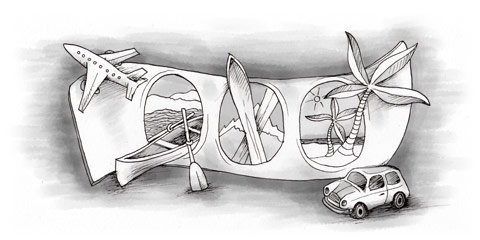The procedure for the importation of a caravan or motorcycle with an engine capacity over 49cc is the same as for a car, although mopeds with engines below 49cc can be freely imported as part of your personal possessions and require no special paperwork.
After you have completed the importation procedure (outlined below), you must not drive your car until your local provincial traffic department has issued temporary (green) registration plates. These are valid for a limited period (usually ten days) and allow you to drive to the nearest testing station for an inspección técnica de vehículos ( ITV) test, which must be passed before you receive a permanent registration number.
The following documents must be submitted at the Jefatura Provincial de Tráfico (traffic department):
- an application form. This can be found at the the local traffic department
- personal documentation for the importer, which includes proof of residence in Spain (residence card or personal identification from your country of origin plus a certificate from the local police in Spain stating that you live in the locality)
- proof of owning or renting a property (the rental contract must be for a minimum of one year)
- Spanish driving license
- Technical Test Certificate Card (received after the ITV test)
- registration document + fee
- confirmation of payment of registration tax (information can be found below)
- receipt of payment of local car tax (impuesto municipal sobre vehículos de tracción mecánica/IVTM)
- vehicle purchase receipt (original and photocopy)
- proof that VAT has been paid in the country of purchase.
- Certificate of Conformity (Certificado de Conformidad) from the vehicle manufacturer or a certified representative (original and photocopy). There are two types of Certificate of Conformity:
- EC Certificate, which is valid throughout the EU, or
- National Certificate, generally issued for modified vehicles, buses, trailers and other large vehicles. It is only valid in the country in which it was issued.
Cars imported from outside the EU may need to undergo the homologation process as well. A vehicle imported tax and duty-free into Spain must not be sold, rented or transferred within one year of its registration.
Details for the exact paperwork and documentation required can be found on the Department of Traffic’s website (http://www.dgt.es ), where you can also download forms.
Homologation
Homologation (homologación) is the procedure whereby vehicles are made to comply with certain safety and other requirements before they can be registered. A vehicle imported from a country outside the EU must undergo homologation and must be certified by the manufacturer or an officially recognised laboratory and undergo a test before it can be registered in Spain. It’s a long and complicated process and the information demanded by the regional authorities often varies with the region of Spain.
Taxes
The following taxes and duty must be paid when importing a vehicle into Spain:
- VAT (IVA) at 16 per cent on cars imported from outside the EU or on a tax-free car (on which VAT hasn’t previously been paid) imported from an EU country;
- the registration tax depends on the CO2 emissions, and most likely you are required to pay 12 percent. The table below will give you more information.
| Percentage tax | Emission |
| 0 | less than 120 grams of CO2 per kilometre |
| 4.75 | from 120 to 160 grams of CO2 per kilometre |
| 9.75 | from 160 to 200 grams of CO2 per kilometre |
| 12 | not rated for CO2 emissions |
| 14.75 | more than 200 grams of CO2 per kilometre |
Source: Agencia Tributaria
- import duty of 10 per cent on vehicles imported from outside the EU unless you’re a resident (see above).
- when importing a new vehicle, you will have to pay 21 percent VAT (IVA). However, used car owned for more than six months prior to the owner becoming resident in Spain are not subject to import duty, provided that VAT was paid in the EU country in which the vehicle was purchased
Each of the above tax rates is applied to the original price of the vehicle, with a reduction for each year of its age up to ten years, e.g. 20 per cent after the first year, 30 per cent after two years, 50 per cent after four years, and 80 per cent after ten years.
Driving a car on foreign registration plates
Residents: A Spanish resident isn’t permitted to operate a car on foreign registration plates. Vehicles registered outside the EU cannot generally be operated in Spain or any other EU country by EU residents, although there are a few exceptions. The importation of right-hand drive (RHD) cars was prohibited in 1991, but this was subsequently reversed (after protests from British residents to the European Commission!). However, only immigrants importing an RHD car may register it in Spain; existing residents aren’t permitted to purchase an RHD vehicle abroad and register it in Spain.
Importing an RHD car into Spain isn’t recommended, as driving an RHD car on the right-hand side of the road is dangerous and your visibility is greatly reduced, particularly when you want to overtake or pull out onto a main road. Numerous accidents occur every year involving RHD cars – usually because they pull out in front of another car they cannot see.
Non-residents: The regulations for non-residents depend on whether you’re an EU national:
- EU Citizens – Non-residents of Spain resident in another EU country can bring a vehicle registered in another EU country to Spain and can use it (for up to 182 days per year) without paying Spanish taxes. The vehicle must be legal in its country of registration, meaning that it must be inspected (for roadworthiness) as appropriate and taxed there.
- Non-EU Citizens – A person resident outside the EU may temporarily import a vehicle registered outside the EU for a total period of six months (which needn’t be continuous) within a calendar year. In certain circumstances, the six-month period can be extended. This applies, for example, to those regularly crossing into EU territory to work, full-time students from outside the EU, and people from outside the EU on a special mission for a specified period. The vehicle can be used only by the owner, his spouse, parents and children (who must also be non-residents). Note, however, that it’s necessary for non-EU citizens to have a foreign-registered vehicle ‘sealed’ (precintado) by customs during periods of absence from Spain.




